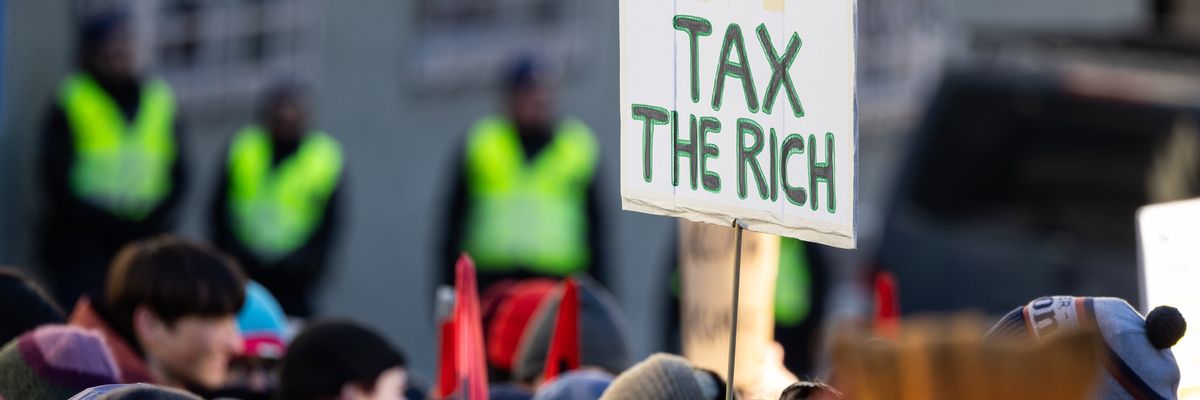Since 2020, a year marked by the spread of a pathogen that killed millions of people, the world's five richest men have seen their collective wealth more than double as five billion people across the globe have lost ground and hunger has surged, underscoring the deep inequality that is fueling mass discontent and eroding democracies.
The finding by Oxfam International was published Monday as elites gathered in Davos, Switzerland for the annual World Economic Forum, a summit that—while ostensibly aimed at confronting the planet's most pressing crises—has long been seen as a symbol of global capital's stranglehold on key institutions.
Oxfam calculated that the combined wealth of the five richest billionaires on the planet grew from $405 billion in 2020 to roughly $869 billion today—a rate of $14 million an hour. During that same period, 60% of the global population got poorer, with the real wages of around 800 million workers across 52 countries falling in the face of high inflation.
Under the status quo, global poverty won't be eradicated for nearly two and a half centuries—but the world will have its first trillionaire within the next 10 years, Oxfam found.
"We're witnessing the beginnings of a decade of division, with billions of people shouldering the economic shockwaves of pandemic, inflation, and war, while billionaires' fortunes boom," Amitabh Behar, Oxfam's interim executive director, said in a statement. "This inequality is no accident; the billionaire class is ensuring corporations deliver more wealth to them at the expense of everyone else."
Overall, the world's billionaires have gotten $3.3 trillion richer since the start of the decade, Oxfam said, noting that their wealth grew three times faster than inflation.
Large corporations, too, have seen their fortunes surge since 2020, with around 150 of the world's biggest companies bringing in a combined $1.8 trillion in profits—a massive boon for wealthy shareholders that came as workers suffered from the economic turmoil induced by the coronavirus pandemic, Russia's invasion of Ukraine, worsening climate impacts, and other global shocks.
Seventy percent of the largest companies have a billionaire as their chief executive or top shareholder.
Oxfam's report spotlights the "sustained and highly effective war on taxation" that powerful corporations have been waging over the past several decades—a war that has yielded a significantly lower corporate income tax rate that has allowed companies to amass vast riches and entrench their political influence.
"Corporate taxes are disproportionately borne by the richest, thus the collapse in corporate taxes in recent decades has essentially provided another tax cut for the wealthy," the report states. "It has also deprived governments around the world, but especially in the Global South, of trillions of U.S. dollars in revenue that could be used to reduce inequality and end poverty. Every tax dollar dodged is a nurse that will never be hired or a school that cannot be built."
To rein in excessive corporate power and accelerating inequality, Oxfam recommended several broad policy solutions, including the break-up of monopolistic companies such as Amazon and a global wealth tax on the world's millionaires and billionaires, which the group estimated could generate $1.8 trillion a year in revenue that could be invested in education, healthcare, environmental protection, and other critical priorities.
"Runaway corporate and monopoly power is an inequality-generating machine: Through squeezing workers, dodging tax, privatizing the state, and spurring climate breakdown, corporations are funneling endless wealth to their ultra-rich owners," said Behar. "But they're also funneling power, undermining our democracies and our rights. No corporation or individual should have this much power over our economies and our lives—to be clear, nobody should have a billion dollars."

